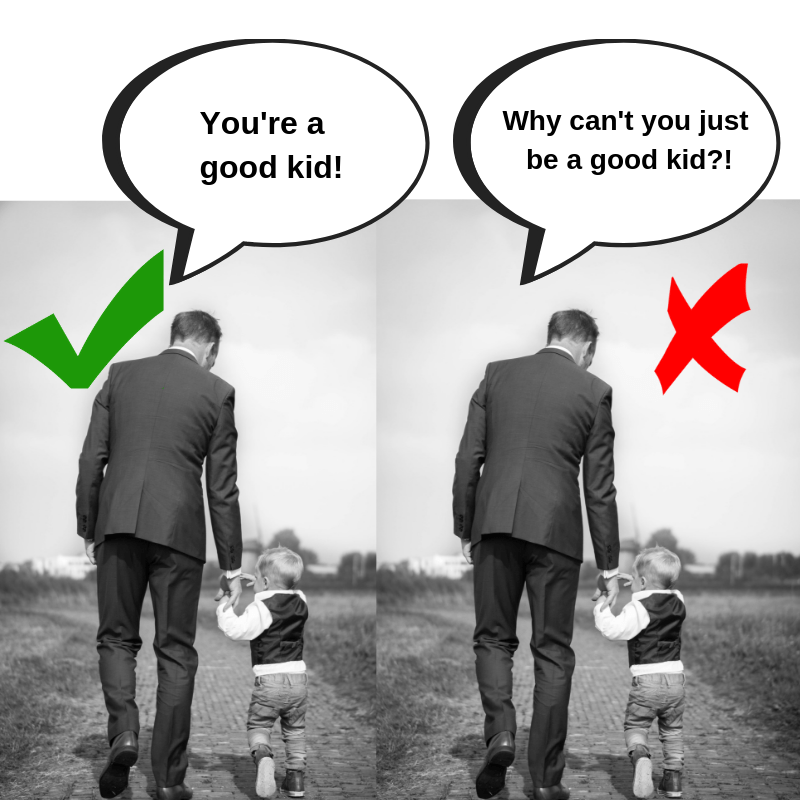Laying the Foundation
Communication with children can be difficult. While we could fill the pages of this blog post with phrases you will want to avoid saying to your child, we have chosen five phrases to serve as examples.
Let’s first examine general rules that affect all communication.
Parent-Child Communication Affects Every Aspect of Effective Parenting
In order to ensure communication with children is effective, you must first recognize the many ways you and your children give messages to one another. These messages are delivered not only through your words but also through your facial expressions, the tone of your voice, the volume with which you speak, and your attitude/feelings.
If your child does something that frustrates you or makes you angry and you try to hide your feelings, you are clearly communicating two very different messages. While the intended message is, “I’m not upset with you,” the actual message is, “I don’t want you to know I’m upset so I’m going to pretend I’m not upset.” Is the child fooled? NO! Have you successfully hidden your anger? NO!
The problem is that you cannot hide your anger. You can try to “cover it up,” but the power of non-verbal communication is so strong that your child almost always still gets the message that you are angry. In fact, your child gets two messages: (1) you are angry and (2) you are trying to hide your anger. Mixed messages such as these are confusing for the child. Additionally, for some children mixed messages are also empowering. The child quickly learns that not only can he control making you angry, but he can almost paralyze you because you become “paralyzed” and will refuse to “own your anger” or talk about how you are feeling.
Extra credit: read more about mixed messages on our other blog post to improve your understanding of communication with children.
Managing the Struggle for Power and Control
Don’t be surprised if you have triggered a “power and control” game in which your child intentionally does things to frustrate you because it gives him a sense of power and control as he literally causes you to “freeze.” Your best bet is to take a deep breath and calmly tell your child that you are angry and that his behavior is not okay with you. You can instruct him to stop immediately and then be sure to inform him of the outcomes he will face if the behavior continues. Perhaps his favorite toy will be put away for a designated period of time. Perhaps he will lose _____ hours of TV time, or he will lose use of his electronics for ____ hours or days, etc. Be sure to choose a fair outcome.
It is important that you always give your child fair outcomes and follow through consistently with the outcomes for particular behaviors. If you don’t follow through consistently you could create a new situation in which your child will “push your buttons” to see how long it takes you to become angry enough to actually follow through with outcomes.
What NOT to Say During Communication with Children
With all of this in mind, let’s explore five phrases you will want to avoid saying during communication with children and why. Remember that effective parenting always includes honest communication. Be direct, be fair, and be honest.
1. “No, I’m not angry at you!”
If you are honestly not angry with your child then this response is acceptable. However, in most cases, if the child has asked if you are angry then he is well aware that he has provoked you. Refer to the beginning of this post to understand why it is so important that you be honest with the child about your feelings.
2. “You have to share your toys.”
Sharing toys can be very uncomfortable and even feel threatening for some children. In fact, “sharing” is a developmental skill and unfolds at an individual pace based on each child’s emotional development. Because of unique developmental challenges in this area, having ownership and control over their own toys is extremely important for most children. In fact, to force them to share may escalate their discomfort and sometimes their aggression as they try to stop what they experience as a threatening invasion.
Parents can choose to force their children to share. Alternatively, they can allow their children to experience the safety and control that comes from having the right to say “this is MINE” without feeling threatened by being forced to share. When they are developmentally ready to share, they will!
One possible solution is to have a toy basket of “family toys” that belong to mom and dad and which everyone can access because “mom and dad want to share their toys with everyone.”
Another solution might be to set up a reward system of some kind whenever one of the children is willing to share one of his toys. Voluntary sharing will need to include an “end” time when the child knows he can have his toys back. Setting a timer is often very useful because the child is assured that he will know when his sharing time is over as the timer makes a buzzing sound.
3. “You are such a disappointment”
IN ALL CASES be very sure to separate the CHILD from the BEHAVIOR. To identify the child as being a disappointment is an inaccurate and damaging statement. In fact, it can be experienced as a personal attack and a statement of worthlessness that may result in very defensive behavior on the part of the child along with a feeling of loss of personal value!
However, to identify the behavior he has chosen as a disappointment is far more accurate and addresses his behavior choice as being unacceptable. The Pillars for Success parenting course is built on a foundation that emphasizes the importance of separating the IDENTITY of the child (who he is as a human being) from an ATTRIBUTE of the child (for instance, a behavior he has chosen or a characteristic of his personality). The damage that occurs when these two concepts are blended serves only to create more problems in the home as the child feels personally attacked rather than corrected for an unacceptable behavior.
Be sure that your anger and disappointment are directed toward the choice the child has made and NOT the value of the child himself.
4. “Why can’t you be more like… your brother, your sister, your cousin, the kid next door?”
Diminishing your child’s value by comparing him to others can affect his self-image, his self-worth, and his relationships with the people to whom he is being compared, and it can also affect his relationship with you because he may feel that no matter how hard he tries it is “never good enough, so why bother?”
How would you feel if you were judged to be inferior to your co-worker, your brother-in-law, or your neighbor? Not only would your self-image and personal value be affected, but your relationship with the person who said it may also be affected.
5. “I don’t think you can do it.”
Your negativity will have a profound impact on your child, and your statement clearly communicates that he is not “good enough” or “smart enough” or “strong enough” to accomplish the task he is facing.
Instead, consider saying, “I bet you’ll give it a good try and let’s see what happens. I’m proud of you for having the courage to try.”
Example: Suppose your statement refers to his choice to try out for the basketball team. He is a junior in high school and although he has played a lot of basketball he has never been on the team before. It takes a lot of guts to decide to try out, and he should be supported in that decision with praise that sounds something like, “You know, it takes a lot of guts to try out for the team when you have never been on the high school basketball team. Good for you! Whether you make the team or not remember that success starts with having faith in yourself and having the courage to try!”
Later on you can reopen the conversation and tell him that being brave enough to plan ahead for goals increases the chance for success because he will have time to learn and practice the skills that are needed. He may not achieve his goals every time he tries but he will certainly learn a lot along the way. For now, support your child’s willingness to take those risks!
Effective Communication with Children is an Art
Parenting communication skills are intentional, rational, supportive, and well practiced. While there may be times when both you and your child are “triggered” and respond based on emotions or defensiveness, remember that your goal is to serve as the role model from whom your child will learn how to deal with adversity, overcome challenges, and find the most effective path to solutions and success.













